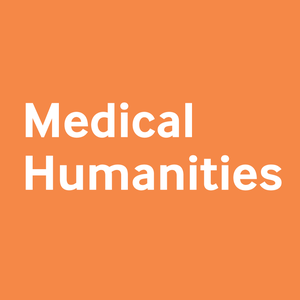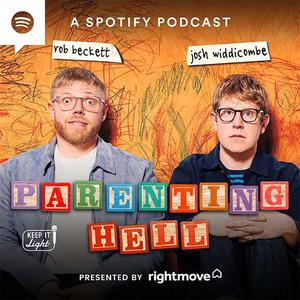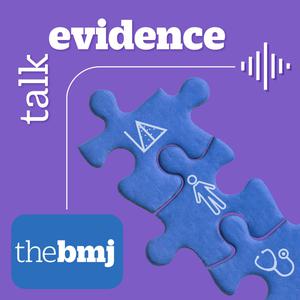
Medical Humanities podcast
BMJ Group
Medical Humanities
- 51 minutes 11 secondsLooking further than what you can see: non-visual design, with Simon Dogger
The design studio of Simon Dogger focusses upon stimulating equity, connection and innovation. He is able to look further than what you can see and not only because he is blind. In cooperation with Dutch schools and universities his studio is working on design education for Visual Impaired People (VIPs). VIPs are resourceful and good inclusive thinkers, but this power is rarely acknowledged. That’s a pity since the design field and societies are in desperate need of different perspectives. This podcast is about the first steps toward a non-visual design school. It deals with the image of VIPs in society, the importance of touch and the benefit for design schools.
In a world where design seems reserved for those who can see, a new perspective is emerging. This podcast delves into the groundbreaking journey of blind and partially sighted designers challenging the visual dominance in the design industry. Through personal stories, innovative methods, and transformative workshops, it reveals how creativity thrives beyond sight. Experience how touch, sound, and emotion redefine design processes, making them more inclusive and human-centered. Join us as we explore a future where design is not just seen but felt, where limitations become strengths, and where diversity reshapes what creativity truly means.
Please read the related blog post and transcript: https://blogs.bmj.com/medical-humanities/2024/12/16/4015/
Visit Simon's website at www.SimonDogger.nl or send him an email at [email protected]. Instagram @Simon_Dogger.
Subscribe to the Medical Humanities Podcast in all podcast platforms, including Apple Podcasts, Google Podcasts, Stitcher and Spotify. If you enjoy our podcast, please consider leaving us a review and a 5-star rating on the Medical Humanities Podcast iTunes page - https://podcasts.apple.com/gb/podcast/medical-humanities-podcast/id961667204. Thank you for listening!
19 December 2024, 11:48 am - 30 minutes 41 secondsThe industrial tragedy at Bhopal through the LivingBodiesObjects’ digital storytelling
The 1984 Union Carbide gas disaster in Bhopal, India, is recognised as the world’s worst industrial disaster.
The Wellcome-funded LivingBodiesObjects project has been working with the Bhopal Medical Appeal (referred to as BMA), a charity funding free healthcare for disaster survivors and water-affected communities. In this podcast episode, LivingBodiesObjects team members Clare Barker and Lynn Wray, and the Bhopal Medical Appeal’s Jared Stoughton introduce their collaborative work to produce new digital resources emerging from the stories of survivors and activists in water-affected areas of Bhopal.
To learn more about the Union Carbide disasters and the work of the Bhopal Medical Appeal, please visit www.bhopal.org. You can also find them on Facebook and Instagram.
Please read the related blog post and transcript: https://blogs.bmj.com/medical-humanities/2024/07/11/livingbodiesobjects-and-the-tragedy-at-bhopal
Subscribe to the Medical Humanities Podcast in all podcast platforms, including Apple Podcasts, Google Podcasts, Stitcher and Spotify. If you enjoy our podcast, please consider leaving us a review and a 5-star rating on the Medical Humanities Podcast iTunes page - https://podcasts.apple.com/gb/podcast/medical-humanities-podcast/id961667204. Thank you for listening!
11 July 2024, 4:00 am - 36 minutes 42 secondsHumanising Care for Older People Living with Dementia - Teun Toebes in conversation with Khalid Ali
Teun Toebes, humanitarian activist, in conversation with Khalid Ali. In this podcast, Teun talks about his book 'The Housemates' (The Housemates by Teun Toebes, Laura Vroomen | Waterstones) and documentary film 'Human Forever' (Human Forever The Film (human-forever.com) describing his quest to understand better the experience of older people living with dementia in care in the Netherlands and globally.
Read the related blog post, including a transcript of this podcast: https://blogs.bmj.com/medical-humanities/2024/05/30/humanising-care-for-older-people-living-with-dementia-teun-toebes-in-conversation-with-khalid-ali
Subscribe to the Medical Humanities Podcast in all podcast platforms, including Apple Podcasts, Google Podcasts, Stitcher and Spotify. If you enjoy our podcast, please consider leaving us a review and a 5-star rating on the Medical Humanities Podcast iTunes page (https://podcasts.apple.com/gb/podcast/medical-humanities-podcast/id961667204). Thank you for listening!
30 May 2024, 8:00 am - 21 minutes 50 secondsMaking Modern Maternity
Introducing their forthcoming special issue of Medical Humanities, Drs. Whitney Wood, Heather Love, Jerika Sanderson, and Karen Weingarten discuss the political significance of “making” our “modern maternity” with Editor-in-Chief Brandy Schillace.
Whitney Wood is Canada Research Chair in the Historical Dimensions of Women’s Health at Vancouver Island University in Nanaimo, British Columbia.
Heather A. Love is Assistant Professor of English at the University of Waterloo (Ontario, Canada).
Jerika Sanderson is a PhD candidate in English at the University of Waterloo. Her research investigates 21 st-century biotechnologies across the media, literature, and popular culture.
Karen Weingarten is Professor of English at Queens College, City University of New York and the author of “Pregnancy Test” and “Abortion in the American Imagination: Before Life and Choice 1880-1940”.
The issue is due in a couple of weeks. In the meantime, please read the related blog post: https://blogs.bmj.com/medical-humanities/2024/05/08/making-modern-maternity/
Subscribe to the Medical Humanities Podcast in all podcast platforms, including Apple Podcasts, Google Podcasts, Stitcher and Spotify. If you enjoy our podcast, please consider leaving us a review and a 5-star rating on the Medical Humanities Podcast iTunes page (https://podcasts.apple.com/gb/podcast/medical-humanities-podcast/id961667204). Thank you for listening!
8 May 2024, 5:00 am - 25 minutes 24 secondsBlack and Brown in Bioethics: A new Medical Humanities Research Forum
In this podcast, our Editor-in-chief Brandy Schillace sits down with Matimba Swana and Kumeri Bandara of Black and Brown in Bioethics to discuss how they started, why it is important to build community when challenging disparities in academia, and how Medical Humanities and Black and Brown in Bioethics are joining forces to transform the academic publishing landscape to cater to more diverse voices, knowledge, and audiences.
Read more: https://blogs.bmj.com/medical-humanities/2024/03/28/research-forum-black-and-brown-in-bioethics
Subscribe to the Medical Humanities Podcast in all podcast platforms, including Apple Podcasts, Google Podcasts, Stitcher and Spotify. If you enjoy our podcast, please consider leaving us a review and a 5-star rating on the Medical Humanities Podcast iTunes page (https://podcasts.apple.com/gb/podcast/medical-humanities-podcast/id961667204). Thank you for listening!
28 March 2024, 6:00 am - 24 minutes 55 secondsScenario Planning, Healthcare, and the Humanities
In this podcast, Brandy Schillace (EIC) and Cristina Hanganu-Bresch (Blog and Associate Editor) talk to Matt Finch and Matthew Molineux about how scenario planning can help inform decisions about healthcare and the role of narrative in building scenarios that teach and humanize the health professions.
Read more: https://blogs.bmj.com/medical-humanities/2024/03/08/scenario-planning-healthcare-and-the-humanities
Subscribe to the Medical Humanities Podcast in all podcast platforms, including Apple Podcasts, Google Podcasts, Stitcher and Spotify. If you enjoy our podcast, please consider leaving us a review and a 5-star rating on the Medical Humanities Podcast iTunes page (https://podcasts.apple.com/gb/podcast/medical-humanities-podcast/id961667204). Thank you for listening!
8 March 2024, 5:00 am - 26 minutes 27 secondsPoetry, Disability, and the Power of Medical Humanities with Kimberly Campanello
Making connections through poetry, disability, and medical humanities. Brandy Schillace, Medical Humanities' Editor-in-Chief, interviews Kimberly Campanello, Associate Professor of Creative Writing at Leeds University, UK.
Read the related blog including the transcription of this podcast: https://blogs.bmj.com/medical-humanities/2023/10/26/on-poetry-disability-and-the-power-of-medical-humanities
Subscribe to the Medical Humanities Podcast in all podcast platforms, including Apple Podcasts, Google Podcasts, Stitcher and Spotify. If you enjoy our podcast, please consider leaving us a review and a 5-star rating on the Medical Humanities Podcast iTunes page (https://podcasts.apple.com/gb/podcast/medical-humanities-podcast/id961667204). Thank you for listening!
26 October 2023, 5:00 am - 29 minutes 35 secondsVirtual Reality and Disability: Supportive learning through VR
Stuart Murray, Professor of Contemporary Literatures and Film, University of Leeds; Wellcome funded LivingBodiesObjects project David Tabron, Blueberry Academy speak to Brandy Schillace about LivingBodiesObjects, the Blueberry Academy, and how Virtual Reality can support those with learning differences.
Read the blog with the transcript of this episode: https://blogs.bmj.com/medical-humanities/2023/07/28/podcast-with-stuart-murray-and-david-tabron
And more on the LBO website https://livingbodiesobjects.org/, and the Blueberry Academy website https://www.blueberryacademy.co.uk/.28 July 2023, 10:03 am - 36 minutes 58 secondsBittersweet Potatoes: Noura Kevorkian, documentary film maker, reflects on the plight, and resilience of Syrian Refugees in Lebanon
In this podcast, Dr Khalid Ali, film and media correspondent, interviews Noura Kevorkian, a Syrian/ Lebanese documentary film-maker.
Noura Kevorkian discusses the personal and professional journey of her award-winning documentary 'Batata', its impact on the film's protagonists, and how the film advocates for the rights of refugees around the world.
Read the blog post and the transcription of the podcast: https://blogs.bmj.com/medical-humanities/2023/06/20/podcast-with-noura-kevorkian-on-the-documentary-film-batata
Subscribe to the Medical Humanities Podcast in all podcast platforms, including Apple Podcasts, Google Podcasts, Stitcher and Spotify. If you enjoy our podcast, please consider leaving us a review and a 5-star rating on the Medical Humanities Podcast iTunes page (https://podcasts.apple.com/gb/podcast/medical-humanities-podcast/id961667204). Thank you for listening!
20 June 2023, 9:16 am - 28 minutes 15 secondsFeaturing the Nocturnist’s SHAME IN MEDICINE: The Lost ForestMedical Humanities, editor-in-chief Brandy Schillace speaks to Emily Silverman, MD, the University of California San Francisco (UCSF)creator of The Nocturnist podcast, and Luna Dolezal, Associate Professor in Philosophy and Medical Humanities based in the Wellcome Centre for Cultures and Environments of Health. They both published a 10-part podcast series called 'Shame in Medicine: The Lost Forest'. Blog link with the transcription of this podcast: https://blogs.bmj.com/medical-humanities/2023/03/02/shame-in-medicine-the-lost-forest Related links: https://shameandmedicine.org/ https://thenocturnists.com/ https://www.thenocturnists-shame.org/
Subscribe to the Medical Humanities Podcast in all podcast platforms, including Apple Podcasts, Google Podcasts, Stitcher and Spotify. If you enjoy our podcast, please consider leaving us a review and a 5-star rating on the Medical Humanities Podcast iTunes page (https://podcasts.apple.com/gb/podcast/medical-humanities-podcast/id961667204). Thank you for listening!
1 March 2023, 12:56 pm - 23 minutes 53 secondsImmersive and Interactive: Accessibility Theatre and LivingBodiesObjectsEditor's in Chief of Medical Humanities, Brandy Schillace, interviews Amelia DeFalco, University of Leeds and Steve Byrne Director/Chief exec of the Interplay Theatre about the Interplay Theatre's work with disabled students and the role of immersive experience for the LivingBodiedObjects project. Related blog including the transcription of the podcast: https://blogs.bmj.com/medical-humanities/2023/01/12/immersive-and-interactive-accessibility-theatre-and-livingbodiesobjects
Subscribe to the Medical Humanities Podcast in all podcast platforms, including Apple Podcasts, Google Podcasts, Stitcher and Spotify. If you enjoy our podcast, please consider leaving us a review and a 5-star rating on the Medical Humanities Podcast iTunes page (https://podcasts.apple.com/gb/podcast/medical-humanities-podcast/id961667204). Thank you for listening!
10 January 2023, 10:20 am - More Episodes? Get the App
Your feedback is valuable to us. Should you encounter any bugs, glitches, lack of functionality or other problems, please email us on [email protected] or join Moon.FM Telegram Group where you can talk directly to the dev team who are happy to answer any queries.
 Parenting Hell with Rob Beckett and Josh Widdicombe
Parenting Hell with Rob Beckett and Josh Widdicombe
 Talk Evidence
Talk Evidence